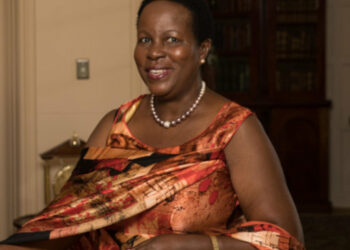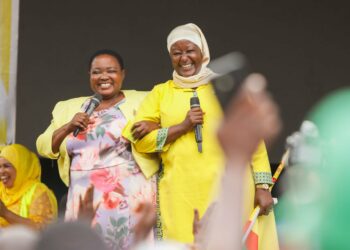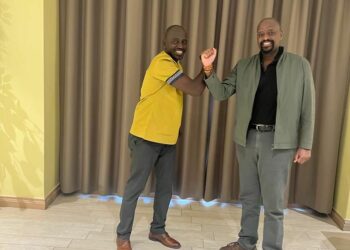Andrew Mwenda is a Ugandan journalist, founder and owner of The Independent, a current affairs news magazine. He was previously the political editor of The Daily Monitor, a Ugandan daily newspaper, and was the presenter of Andrew Mwenda Live on KFM Radio in Kampala.
He was born in 1972 to the late Phillip Muhangazima and Constance Kabakaali.
He attended Nyakasura School and Mbarara High School, both in the Western Region of Uganda, before attending Busoga College Mwiri in the Eastern Region.
A winner of the British Chevening Scholarship, Mwenda holds a Master of Science degree in development studies from the University of London’s School of Oriental and African Studies and a bachelor’s degree in journalism from Makerere University in Uganda.
He was a visiting fellow at Yale University (2010), a fellow at the University of Oxford’s Said School of Business (2009), a John Knight Fellow at Stanford University (2006–07), a visiting lecturer at the University of Florida at Gainesville (2005), and a visiting fellow at the University of Leiden’s Africa Study Centre (2003).
In 2005, he was among sixteen senior journalists invited by the British government to discuss with Prime Minister Tony Blair the forthcoming report of the Commission for Africa.
Mwenda is the managing director of Independent Publications Limited, the publishers of The Independent, a current affairs newsmagazine. An admirer of Socrates, Karl Popper, and Frederick Von Hayek, he is an activist, a journalist, a columnist, a part-time poet, a businessman, and a social entrepreneur. Mwenda is a recognized African voice in the global debate on the failures of foreign aid to Africa and the need for investment and trade as drivers of growth. A TED speaker, he is a regular speaker at conferences across the world.
Mwenda worked as a political editor of the Daily Monitor and general manager of its affiliate on FM radio, KFM, before establishing The Independent in 2007. He has worked as a consultant for the World Bank, the World Resources Institute, and Transparency International. He has also written for international news media like Des Spiegel, the International Herald Tribune, The New York Times, and Foreign Policy. He also has produced documentaries for BBC World television and radio.
Mwenda has also authored and co-authored articles for international academic journals like Africa Affairs, the Journal of Modern African Studies, the Review of African Political Economy, the Journal of Commonwealth Studies, the Journal for Contemporary African Studies, and the Journal of Democracy on top of publishing chapters in several books.
In April 2008, he was arrested and released on bail by the Ugandan government for “being in possession of seditious material and of publishing inflammatory articles”. In August 2005, he was charged with sedition for broadcasting a discussion of the cause of death of Sudanese vice-president John Garang. Garang was killed when the Ugandan presidential helicopter crashed in a storm over a rebel area, on the way back from talks in Uganda. During his radio programme, the journalist accused the Ugandan government of “incompetence” and said they had put Garang on “a junk helicopter … at night … in poor weather … over an insecure area”. He also criticized President Yoweri Museveni, calling him a failure, a coward, and a “villager”, and said the president’s days were numbered if he “goes on a collision course with me”.
In July 2006, Mwenda appeared before the British House of Commons committee on Global Poverty to testify against aid to Africa. He has written widely on the effects of aid on the development process in Africa and been published in such prestigious newspapers as the International Herald Tribune and Der Spiegel and done radio and television documentaries for the BBC on this subject. Mr. Mwenda has also been widely quoted in international media – BBC, CNN, The New York Times, The Washington Post, The Times, The Economist, and many other newspapers, radio and television networks in Europe and North America.
He has assiduously criticized aid agencies and charities for what he says is their ineffectiveness and collusion with corruption. He believes that western aid has been largely unhelpful for African development, since it encourages dependency, sustains wars and fuels corrupt states. He argues that aid goes to the least deserving states, those that have failed their people, rather than those that have reformed. In June 2007, he gave a speech about these issues at the TED conference in Arusha, Tanzania.
In 2014, Mwenda was among the petitioners for annulling The Uganda Anti-Homosexuality Act, 2014.
Nominated by Foreign Policy among the Top 100 Global Thinkers in 2010, Mwenda was also nominated by the World Economic Forum as a Young Global Leader in 2008 and by the Africa Study Institute as an Archbishop Tutu fellow, a program for “Africa’s future leaders” (2009).
He has also won the International Press Freedom Award (2008) by the Committee to Protect Journalists “in tribute to his commitment to a free press in Uganda and the whole world” and the Outstanding Alumni Award from the British Council(2006).
Family:
He is a brother to Margaret Muhanga, the Burahya Member of Parliament and Brigadier Kayanja Muhanga.
Additional info from Wikipedia
Do you have a story in your community or an opinion to share with us: Email us at editorial@watchdoguganda.com











